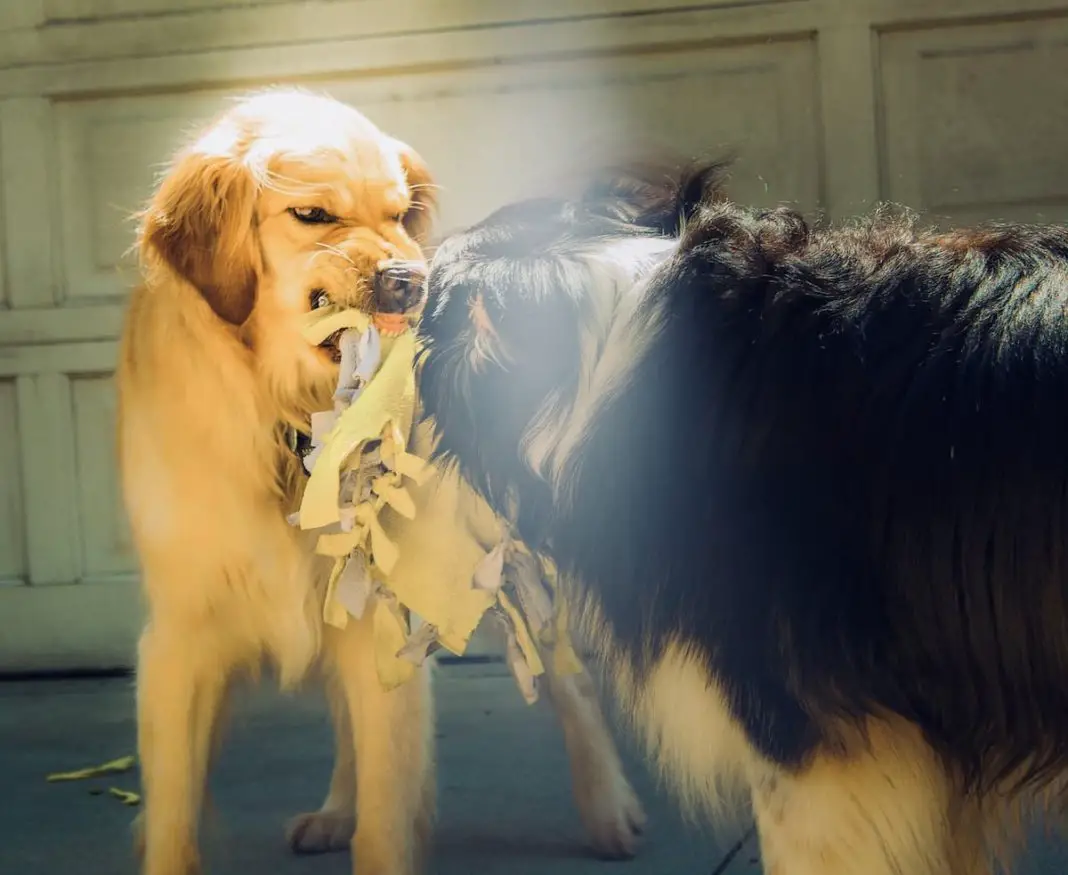Why Is My Golden Retriever Snarling?
There’s no mistaking the low menacing rumble of a Golden Retriever snarling. Your Golden Retriever uses this vocalization for all types of situations, whether they’re trying to guard their favorite bone or as a warning for someone to back off. But what is the underlying motivation for snarling? Is it aggression, fear, bossiness, or something completely different? And can you do anything about it? Read on to learn why your Golden Retriever is snarling, what it means, and what you can do.
The Warning Snarl
It’s innate for a dog to threaten another dog with a snarl, or it might be a response to feeling cornered. Snarling is also a common symptom of resource guarding in dogs. An injured dog will often snarl to keep others at arm’s length. In these cases, snarling may indicate that something is bothering your dog.
You can think of this snarling as a signal of stress. Snarling is a way for a dog to tell you that your dog is uncomfortable. And that’s invaluable. As of now you can intervene on your dog’s behalf and change the situation before your Golden Retriever feels the need to resort to more serious measures like biting.
What Is Stress Snarling?
A dog will use snarling as a warning signal. The purpose of snarling is to tell others to back off before the dog feels that they have to take further action. Most dogs won’t want to attack or bite, so they’ll typically snarl to prevent the situation from escalating. And that’s why snarling can be of great value, as a dog that attacks without warning is incredibly dangerous. Appreciate snarling as an insight to your Retrievers state of mind and for the time this gives you to intervene, to help your dog, and to prevent the situation from getting any worse.
Why You Shouldn’t Punish Snarling
Hopefully, you now recognize that you should never correct snarling. If you punish your dog for snarling, you’ll only repress the snarling, so you won’t have done anything to address your Golden Retrievers underlying issue. For example, punishing your dog for snarling in the presence of other dogs will probably stop the snarling. However, if your dog still feels uncomfortable around other dogs, the lack of snarling may fool you into thinking otherwise. Meanwhile, not only would your Golden Retriever still be stressed, but they may snap without the warning.
Unfortunately, if you punish your dog for snarling, you could just exacerbate the underlying issue further. For example, if your Golden Retriever is snarling at another dog and you punish the snarling, your Golden Retriever may probably think that the other dog has caused your negative action. Now your golden retrievers’ discomfort will be even stronger.
Handling A Snarling Golden Retreiver
The most effective way to deal with snarling is to determine what’s bothering your Golden Retriever in the first place. Only then can you treat the underlying issue. The very first thing you should do is to immediately, do whatever you can to change the situation to suit your golden retriever. For example, if your Golden Retriever is stressed by the presence of another dog while you’re taking them for a walk down the street, simply cross the street, or do whatever you need to do to make your dog more relaxed. If you’re going too close to your dog’s bone, then back off and let your dog be.
Next, determine what specifically led to the snarling. For the time being, make it your priority to eliminate that situation from happening again for your dog. For example, if another dog is close by and stressing out your Golden Retriever, then don’t take them to the dog park. If your dog also guards their bones, stop giving them bones, and so on.
Finally, permanently address the snarling with a behavior modification program. Techniques such as desensitization and counterconditioning can change your golden retrievers’ attitude towards the underlying issue that causes them to snarl in the first place. For your dog’s sake and your own safety, you need to help your Golden Retriever become comfortable with the things that once caused them so much stress. However, this isn’t an overnight solution and could require help from an animal behaviorist or dog trainer. The first thing you need to do is manage your dog’s environment while helping them become more confident and comfortable with their stressors, and ideally, they’ll never feel the need to snarl from stress again. But if they do, now you’ll know how to handle it.
Reasons Why Your Golden Retreiver Is Snarling
Injury or Discomfort
There’re some dogs that are just daredevils, some dogs will leap off the bed as if they’re Superman, while others are more curious, rambunctious and just overly clumsy. But whatever the case may be, your Golden Retriever could possibly injure themself a few times in their life. Whether they get a nasty porcupine quill in the nose or get a broken nail, canine injuries will probably happen sometime in a dog’s life. If your Golden Retriever was in pain or discomfort and behaving abnormally. Trying to touch their injury, may cause them to snarl and show you, their teeth. In this case, the snarling is only temporary and will cease as your dog recovers.
Medication
If you’ve ever had to give your Golden Retriever pills, you’ll sometimes have had to shove down your dog’s throat (not literally of course, but that’s how your dog may’ve felt!). Pills aren’t only a nuisance, but they could cause a shift in your dog’s behavior, making them nauseous or even aggressive, causing them to snarl and snap at people and animals.
Possession Aggression
Possession aggressive dogs may snuggle with you on the couch and snooze with you in bed at night without any problem. But walking past their food bowl while they’re eating and they may let you know of their distaste. If your dog is aggressive over their possessions, then they’ll only start to snarl when they’re afraid thinking that you’re going to take something away from them. While some dogs may only be protective of their food, others could get quite angry when you’re near their favorite toy or anything else that they consider theirs. It’s not that your dog doesn’t love you, it’s just that they think that there’s a chance you may take its belongings.
Scared
If you think back to when you were really scared, you probably wouldn’t have been in the right frame of mind. The same thing happens to our loving dogs. When your dog is terrified of something, and they want to get away from it or want it to stop they could snarl. Whether it’s diving under the bed when a firework goes off or trembling when a thunderstorm is rolling through. Snarling is often reserved when something they’re afraid of approaches them, like another dog or a child. So, when your dog hears thunder, they might pace by the door, snarling at you if you come near them.
Aggravated Humans aren’t the only ones who become aggravated in certain situations. Our dogs can become quite frustrated, snarling in response. For example, let’s say a child is petting your dog a bit too rough around the head. Despite your dog’s love for them, your dog may eventually think, “Enough is enough” and snarl at them, letting the child know they need to stop.
A Closer Look Into Why A Dog Snarls
Dogs will use snarling mainly because they are conflict avoiding creatures. If you take a look into the behavior of their ancestors, you’ll notice that, in a pack of wolves, constantly fighting with other members of the pack is a total loss of energy that it’s simply not worth the hassle.
After all, their energy must be saved for more important functions such as hunting or taking care of a litter of pups.
Dogs, therefore, tend to avoid conflict by using different vocalizations and body postures. Most dogs naturally know what these signs mean and normally stay clear from conflict as a result.
Snarling is a dog’s equivalent of “using his words.” It’s the canine equivalent of a human saying, ‘’Please don’t do that, it makes me feel uncomfortable.”
So, it’s unfortunate, when in many cases, a dog’s snarl will go ignored, or worse, get punished for it.
Case Study: A Dog Being Punished for Snarling
When a two-year-old Golden Retriever named Cooper started growling after being hugged by a child, the owner decided to discipline the behavior by giving the Golden Retriever a scolding and a strong leash correction.
The owner thought that this reprimand was not only for the dog’s own good but to protect the child and the owner who claimed that the dog’s snarling behavior had since stopped from that day on.
Indeed, Cooper no longer growled at the child and the owner carried on thinking that everything was back to normal. They kept a good eye on Cooper when it was around the child for a while and after a month, there was no incident; the owner started to give the Golden Retriever some trust back.
However, the owner didn’t know that deep inside Cooper’s mind there were still some big conflicts going on and that they had only ultimately dealt with the tip of an iceberg.
One day, the child came back from school and saw Cooper wagging its tails and acting friendly; the child decided to give Cooper a big hug, wrapping their arms around it giving a nice kiss between the dog’s forehead. But little did the child know that that day would have turned into a memorable one.
Upon kissing Cooper, Cooper quickly turns, biting the child on the face. Although no skin was broken, a few teeth marks were left, leaving the child with a memorable emotional scar that could never be removed.
The majority of people would normally understand the situation. Cooper had proved to not like being around the child. Yet, the owner missed one big, crucial point.
Indeed, their own actions could have led to the very bite if only they knew a bit more about dog psychology.
Many Dogs Do Not Like Being Hugged
Studies have shown that bending over a dog, while putting the face close to the dog’s face and making eye contact (all the same behaviors taking place when kissing a dog), had often led to bites directed towards the central area of the face.
Sadly, studies, have shown that more than two-thirds of the victims were children. It’s not the child’s fault as young children often perceive dogs as living stuffed animals that they just want to hug like they would with their toys.
Back to the case study, since the child and Cooper’s owner didn’t understand the warning signs of the dog feeling uncomfortable, they ignored them all together. So, they completely failed to see the early warning signs such as Cooper freezing, lip licking, getting tense and turning the head upon being hugged.
Feelings Of Tension Building Up
The Golden Retriever didn’t forget about the experience. Indeed, as time went by, they grew more and more stressed. Many dogs just do not tolerate hugs very well, as they are not part of their canine communication. A lot of dogs feel quite threatened by them and become quite defensive.
So, the child continued to hug the dog until the dog emits that snarling sound that alerts the dog owner. As mentioned previously, they grabbed the Golden Retriever at the collar and scolded them heavily.
The dog owner decided to keep the child and dog away from each other for some time and after a while feels sorry for the child asking repeatedly to see the dog again, so they decide to let the child go near the dog again. The Golden Retriever acts well and no longer growls. The issue seems finally solved.
The Golden Retriever just becomes more and more uncomfortable and stressed. You could almost hear him saying: ‘’No please, I feel very uncomfortable when you do that, please don’t do that, it really makes me uncomfortable’’.
However, snarling is not a very rational response from a dog, it’s actually rather innate. A sort of primal form of self-defence. In some way, similar to your reaction, if somebody was getting in your face out of nowhere, it would cause you to become “defensive’’.
So deprived of his most useful warning sign, your dog’s snarl goes to one of their rarely used, and their ultimate last arm of defence: a warning bite.
It’s a dog’s way of saying, “I have repeatedly tried hard to warn you, but I had to do this to make you understand, and this is my wake-up call, don’t make me go beyond this point’’.
Not only has the dog learned the hard way to stop giving advance notice of an upcoming bite (snarling), but now because they were punished when next to the child, the dog could start thinking that being close to the child actually causes bad things to happen to them. So, again, the stress just builds on some more.








